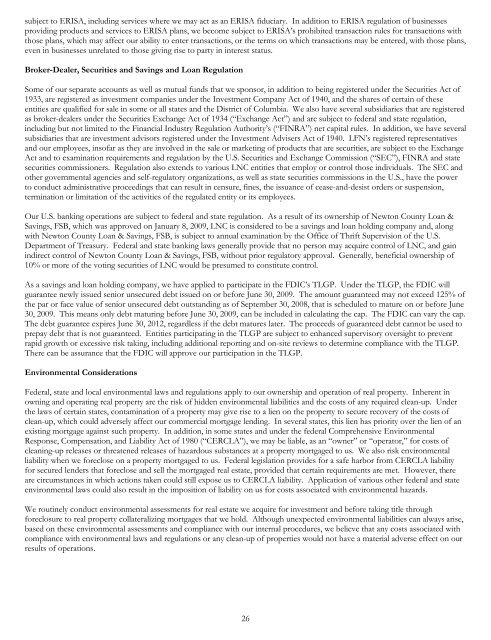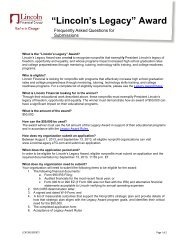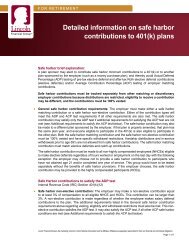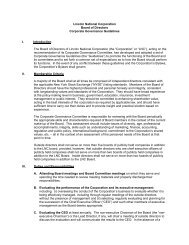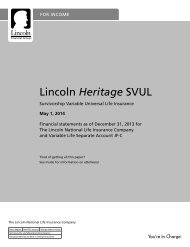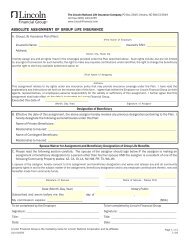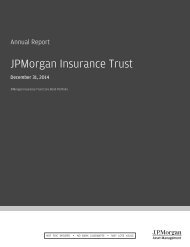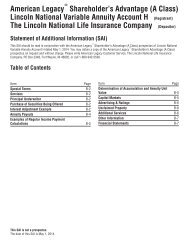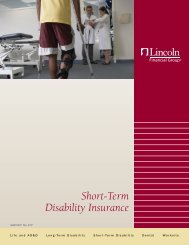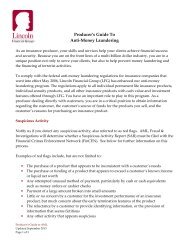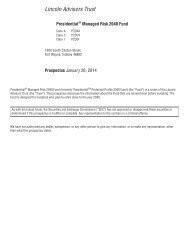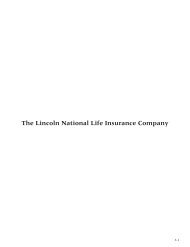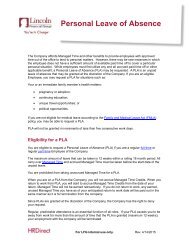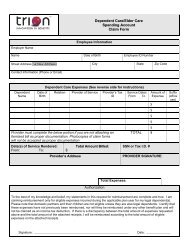2008 Annual Report to Shareholders - Lincoln Financial Group
2008 Annual Report to Shareholders - Lincoln Financial Group
2008 Annual Report to Shareholders - Lincoln Financial Group
You also want an ePaper? Increase the reach of your titles
YUMPU automatically turns print PDFs into web optimized ePapers that Google loves.
subject <strong>to</strong> ERISA, including services where we may act as an ERISA fiduciary. In addition <strong>to</strong> ERISA regulation of businesses<br />
providing products and services <strong>to</strong> ERISA plans, we become subject <strong>to</strong> ERISA’s prohibited transaction rules for transactions with<br />
those plans, which may affect our ability <strong>to</strong> enter transactions, or the terms on which transactions may be entered, with those plans,<br />
even in businesses unrelated <strong>to</strong> those giving rise <strong>to</strong> party in interest status.<br />
Broker-Dealer, Securities and Savings and Loan Regulation<br />
Some of our separate accounts as well as mutual funds that we sponsor, in addition <strong>to</strong> being registered under the Securities Act of<br />
1933, are registered as investment companies under the Investment Company Act of 1940, and the shares of certain of these<br />
entities are qualified for sale in some or all states and the District of Columbia. We also have several subsidiaries that are registered<br />
as broker-dealers under the Securities Exchange Act of 1934 (“Exchange Act”) and are subject <strong>to</strong> federal and state regulation,<br />
including but not limited <strong>to</strong> the <strong>Financial</strong> Industry Regulation Authority’s (“FINRA”) net capital rules. In addition, we have several<br />
subsidiaries that are investment advisors registered under the Investment Advisers Act of 1940. LFN’s registered representatives<br />
and our employees, insofar as they are involved in the sale or marketing of products that are securities, are subject <strong>to</strong> the Exchange<br />
Act and <strong>to</strong> examination requirements and regulation by the U.S. Securities and Exchange Commission (“SEC”), FINRA and state<br />
securities commissioners. Regulation also extends <strong>to</strong> various LNC entities that employ or control those individuals. The SEC and<br />
other governmental agencies and self-regula<strong>to</strong>ry organizations, as well as state securities commissions in the U.S., have the power<br />
<strong>to</strong> conduct administrative proceedings that can result in censure, fines, the issuance of cease-and-desist orders or suspension,<br />
termination or limitation of the activities of the regulated entity or its employees.<br />
Our U.S. banking operations are subject <strong>to</strong> federal and state regulation. As a result of its ownership of New<strong>to</strong>n County Loan &<br />
Savings, FSB, which was approved on January 8, 2009, LNC is considered <strong>to</strong> be a savings and loan holding company and, along<br />
with New<strong>to</strong>n County Loan & Savings, FSB, is subject <strong>to</strong> annual examination by the Office of Thrift Supervision of the U.S.<br />
Department of Treasury. Federal and state banking laws generally provide that no person may acquire control of LNC, and gain<br />
indirect control of New<strong>to</strong>n County Loan & Savings, FSB, without prior regula<strong>to</strong>ry approval. Generally, beneficial ownership of<br />
10% or more of the voting securities of LNC would be presumed <strong>to</strong> constitute control.<br />
As a savings and loan holding company, we have applied <strong>to</strong> participate in the FDIC’s TLGP. Under the TLGP, the FDIC will<br />
guarantee newly issued senior unsecured debt issued on or before June 30, 2009. The amount guaranteed may not exceed 125% of<br />
the par or face value of senior unsecured debt outstanding as of September 30, <strong>2008</strong>, that is scheduled <strong>to</strong> mature on or before June<br />
30, 2009. This means only debt maturing before June 30, 2009, can be included in calculating the cap. The FDIC can vary the cap.<br />
The debt guarantee expires June 30, 2012, regardless if the debt matures later. The proceeds of guaranteed debt cannot be used <strong>to</strong><br />
prepay debt that is not guaranteed. Entities participating in the TLGP are subject <strong>to</strong> enhanced supervisory oversight <strong>to</strong> prevent<br />
rapid growth or excessive risk taking, including additional reporting and on-site reviews <strong>to</strong> determine compliance with the TLGP.<br />
There can be assurance that the FDIC will approve our participation in the TLGP.<br />
Environmental Considerations<br />
Federal, state and local environmental laws and regulations apply <strong>to</strong> our ownership and operation of real property. Inherent in<br />
owning and operating real property are the risk of hidden environmental liabilities and the costs of any required clean-up. Under<br />
the laws of certain states, contamination of a property may give rise <strong>to</strong> a lien on the property <strong>to</strong> secure recovery of the costs of<br />
clean-up, which could adversely affect our commercial mortgage lending. In several states, this lien has priority over the lien of an<br />
existing mortgage against such property. In addition, in some states and under the federal Comprehensive Environmental<br />
Response, Compensation, and Liability Act of 1980 (“CERCLA”), we may be liable, as an “owner” or “opera<strong>to</strong>r,” for costs of<br />
cleaning-up releases or threatened releases of hazardous substances at a property mortgaged <strong>to</strong> us. We also risk environmental<br />
liability when we foreclose on a property mortgaged <strong>to</strong> us. Federal legislation provides for a safe harbor from CERCLA liability<br />
for secured lenders that foreclose and sell the mortgaged real estate, provided that certain requirements are met. However, there<br />
are circumstances in which actions taken could still expose us <strong>to</strong> CERCLA liability. Application of various other federal and state<br />
environmental laws could also result in the imposition of liability on us for costs associated with environmental hazards.<br />
We routinely conduct environmental assessments for real estate we acquire for investment and before taking title through<br />
foreclosure <strong>to</strong> real property collateralizing mortgages that we hold. Although unexpected environmental liabilities can always arise,<br />
based on these environmental assessments and compliance with our internal procedures, we believe that any costs associated with<br />
compliance with environmental laws and regulations or any clean-up of properties would not have a material adverse effect on our<br />
results of operations.<br />
26


